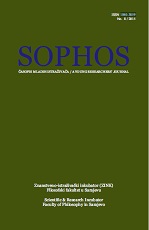Ayerova interpretacija Descartesovog stava Cogito, ergo sum
AYER’S INTERPRETATION OF DESCARTES’ STATEMENT COGITO, ERGO SUM
Author(s): Kenan ŠljivoSubject(s): Epistemology, Analytic Philosophy
Published by: Filozofski fakultet u Sarajevu - Znanstveno-istraživački inkubator
Keywords: Descartes; Ayer; positivism; Cogito;
Summary/Abstract: In this paper, I will explicate the basic aspects of Ayer’s criticism of Descartes’ statement“Cogito, ergo sum”. Namely, Ayer tried to show in his criticism that this statement is an expression of Descartes’ tendency to deduce all human knowledge from intuitively certain premises. What I want to show in this paper is that Ayer’s critique of this statement has in itself entirely integrated positivist matrices about the understanding of traditional metaphysics. This positivist criticism takes Descartes’ philosophy as the most representative example of the metaphysical way of thinking. In this article, I want to show that the evaluation of Ayer’s criticism of Descartes entirely depends on the acceptance of the positivist philosophical project, in other words, I want to show that this analytical endeavor of Ayer is acceptable only from the perspective of requirements which are set before philosophy by the positivist orientation on the conceptual value of various philosophical systems.
Journal: Sophos- časopis mladih istraživača
- Issue Year: 2015
- Issue No: 08
- Page Range: 47-61
- Page Count: 15
- Language: Bosnian

